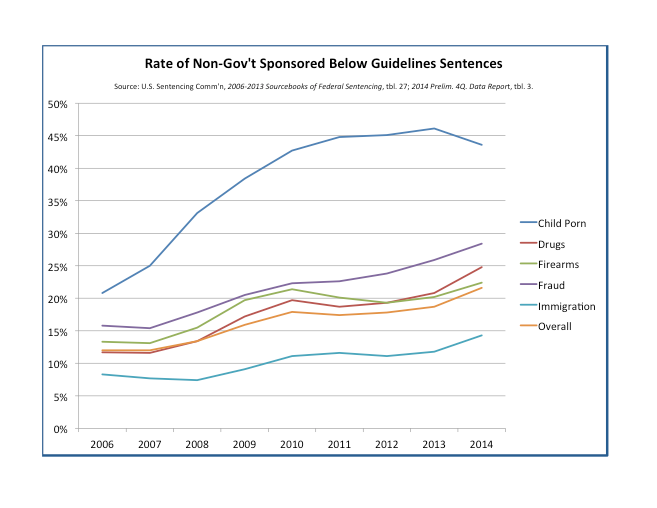
Click for the PDF version of this article.
Approximately 97 percent of all federal criminal defendants plead guilty. Seventy-five percent of the others who proceed to trial are convicted. Almost 99 percent will ultimately be sentenced. Over 87 percent will be sentenced to prison. Thus, for most offenders the three key concerns are: “How much time am I going to do?” “Where am I going to do it?” “How soon am I going to get home?” The following tips are offered in an effort to secure the lowest possible sentence.
Below-guidelines variance sentences are on the rise, while sentences within the guidelines continue to decrease. According to the statistics compiled by the US Sentencing Commission since Booker, non-government-sponsored (e.g., non-section 5K1.1 departures) below-guidelines sentences have increased from 12 percent of all sentences imposed in 2006 to 20.8 percent in 2014. Within-guidelines sentences have decreased from 61.7 percent of all sentences imposed in 2006 to 47.2 percent in 2014. The increase in below-guidelines sentences is even more dramatic when looking at particular offense categories. For example, non-government-sponsored below-guidelines sentences for child pornography offenses—perhaps the most controversial of all types of guidelines sentences—have more than doubled from only 20.8 percent of all such sentences imposed in 2006 to 43.8 percent in 2014. The trends for non-government-sponsored below-guidelines sentences in the top five offense categories, as well as the trend for sentences overall, are shown in figure 1.

Cost of incarceration. Do not forget to remind the court of the continuing crisis in overcrowding the Bureau of Prisons is experiencing, which necessarily makes access to rehabilitation and medical care all the more difficult, and further can accentuate any vulnerability to abuse that a client may face. The latest statistics indicate the current population is at 138 percent of capacity. As of 2014, the Inspector General for the Department of Justice has listed for the past two years reform of the federal prison system as the top challenge facing the department—higher even than terrorism.
Mid-range sentencing options—home confinement. Judges sometimes impose a split sentence, that is, a sentence that combines incarceration and home confinement. Zone C of the federal Sentencing Table allows a judge to impose a split sentence with guidelines ranges of 10–16 months or 12–18 months. The period of incarceration will likely be served in a federal prison. And in some cases, an offender may be designated by the Bureau of Prisons to serve his or her sentence in a detention facility’s (such as MDC Brooklyn, FDC Philadelphia, FDC Houston, MDC Los Angeles, MCC Chicago) Work Cadre Program. To ensure that the client does not have to be incarcerated in a federal prison, let alone a detention facility that houses all sorts of inmates, suggest that a sentence of probation or time served plus supervised release conditioned upon the same amount of time in a residential reentry center (RRC), i.e., halfway house, be imposed. You may even want to suggest more time in the RRC than called for by the guidelines.
Allocution. Don’t overlook the importance of allocution. For an excellent discussion, see US District Judge Mark W. Bennett’s article entitled “Heartstrings or Heartburn: A Federal Judge’s Musings on Defendants’ Right and Rite of Allocution” in the March 2011 issue of the NACDL’s The Champion.
Character letters. Defenders must educate probation officers about clients before prosecutors have had an opportunity to poison the well. One way to do so is by providing probation officers with favorable character letters. Defenders can provide clients with a character instructional letter to send to family, friends, and supporters with guidance on how to write a character letter. Here is one of ours:
Client’s Name Client’s Address
Dear [Client’s Name]:
I understand that there are a number of individuals including friends, family members, and business associates who know you and wish to write letters to the Court about you, but who believe they could use some guidance about how to convey their messages. Character letter writers often could use some guidance about how to convey their messages. I told you I would attempt to provide some guidance, and am doing so in this letter for their use.
The letters should be addressed to the Judge:
Honorable __, Judge
United States District Court
Address
but should be sent to me so that I may review them to make copies for the prosecutor and the Probation Officer before sending them on to the Judge. The letters should be in the words of the letter writer, should be concise, and should be genuine. There should be no orchestrated letter-writing campaign; instead, individuals who strongly feel they have relevant information for the Judge should be given a copy of this letter to assist in expressing those views. Writers should refrain from including their address and telephone number on the letter as it will need to be redacted.
What follows are some suggestions which these letter writers may wish to incorporate:
- State their present or former position, e.g., “I am/ was the Pastor of the XYZ church.”
- Describe their relationship with you, including the nature and the length of the relationship, and how you met.
- Describe the good that you have done in charitable, educational, civic, or business activities. Particular experiences which the writer has had with you and which demonstrate your human vir- tues would be helpful. An anecdote—an act of charity, or a particular kindness—briefly stated may be worth far more than merely describing you in abstract terms as “decent.”
- Express belief in your honesty and how your conduct was out-of-character with everything else you’ve done in your life.
- Tell the Judge, in the strongest possible terms, why imprisonment would be tragic to you, your family, and the community.
- Plead for consideration as a human being based on what you have been doing in your entire life.
- Plead for mercy or compassion based on your service to others (without your having expected anything in return), not as a special favor.
- Use their own thoughts and language as they see fit. Of course, the suggestions above are not all-inclusive, and some letter writers may not be in a position to make statements based on their experience about all areas described above. What is important is that the letters be genuine and reflect the deeply held beliefs of the letter writer.
Additionally, I strongly suggest that letter writers NOT:
- Question the guilty verdict or finding of guilt;
- Comment on the evidence in the case;
- Suggest a particular sentence;
- Express personal views on the criminal justice system; or
- Use the words “lenient” or “leniency” in requesting sentencing by the Judge.
I would be happy to discuss these suggestions further with you or with any person interested in writing to help you.
Finally, even though your sentencing date is not until __, it would be useful for me to receive the letters no later than __.
Sincerely yours,
ALAN ELLIS
LAW OFFICES OF ALAN ELLIS
Originally published in Criminal Justice, Volume 39, Number 1, Spring. © 2015 by the American Bar Association. Reproduced with permission. All rights reserved.This information or any portion thereof may not be copied or disseminated in any form or by any means or stored in an electronic database or retrieval system without the express written consent of the American Bar Association.



